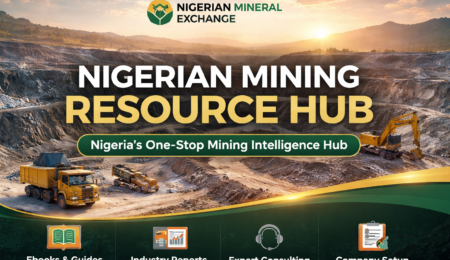The foundation of any successful mining or mineral business in Nigeria is not found underground; it’s laid in the legal framework that governs the entire industry. The Nigerian Minerals and Mining Act, 2007 is the primary legislation that defines every rule, from who owns the minerals to how you can legally prospect, mine, and trade them. Ignorance of this Act is the single greatest risk to any investment, and this guide is designed to be your compass.
This is not a simplified summary. This is a critical breakdown of the Act’s most important provisions, designed to empower you with the knowledge needed to build a fully compliant, risk-averse, and profitable enterprise.
The Fundamental Principles of the Act
Before diving into the details, you must grasp the core principles that define the entire sector:
- State Ownership: The Act, in its very first section, establishes that the entire property and control of all mineral resources in Nigeria are vested in the Federal Government. This means that a landowner does not own the minerals beneath their land. Mineral rights are separate from surface rights.
- “No Authority, No Activity”: The Act explicitly prohibits any person from searching for or exploiting mineral resources without a valid mineral title granted by the Mining Cadastre Office (MCO). Any activity conducted without this authority is illegal and carries severe penalties.
Your Key Mineral Titles Explained
The Act categorizes various mineral titles, each with a specific purpose, duration, and set of obligations. Choosing the right one is your first critical business decision.
- Reconnaissance Permit:
- Purpose: A non-exclusive right to search for minerals. Think of it as a preliminary survey.
- Duration: One year, renewable annually.
- Area: No size limit, as it is a non-exclusive permit.
- Exploration License:
- Purpose: An exclusive right to explore and evaluate mineral resources in a defined area. This is the stage where you determine the commercial viability of a deposit.
- Duration: Three years, with two-year renewals for a total not exceeding seven years.
- Area: A land area not exceeding 200 square kilometers.
- Small-Scale Mining Lease:
- Purpose: An exclusive right to carry out small-scale mining.
- Duration: Five years, renewable for further periods of five years.
- Area: An area not exceeding 3 square kilometers. This is a common entry point for entrepreneurs.
- Mining Lease:
- Purpose: An exclusive right to carry out all mining operations on a commercial scale. This is the ultimate goal for a large-scale project.
- Duration: Twenty-five years, renewable for a further 24 years.
- Area: An area not exceeding 50 square kilometers.
Mandatory Obligations & Investor Incentives
The Act is not just about rules; it also provides a framework for sustainable, responsible mining and offers significant incentives to attract serious investors.
- Community Development Agreement (CDA): A legally binding requirement, the CDA ensures that mining companies contribute to the social and economic development of their host communities. It is a mandatory part of the legal compliance framework and is crucial for maintaining social license to operate.
- Environmental Compliance: The Act establishes strict environmental obligations. Miners must conduct an Environmental Impact Assessment (EIA) and submit a detailed Environmental Protection and Rehabilitation Plan (EPRP) before commencing operations. Non-compliance can lead to massive fines and revocation of licenses.
- Financial Incentives: The Act is investor-friendly, providing:
- A three-to-five-year tax holiday.
- Import duty waivers on mining equipment.
- 100% repatriation of profits and foreign exchange.
This level of detail is what separates a novice from an authority. Our ebook, Nigerian Mining Industry: Environmental and Regulatory Compliance, is a comprehensive breakdown of the Act’s most critical sections. It simplifies the legal jargon and provides a practical checklist to ensure your business is fully compliant from day one, saving you from costly legal fees and sanctions.
The Harsh Realities of Non-Compliance
The MSMD, in collaboration with agencies like the Nigeria Security and Civil Defence Corps (NSCDC) and the EFCC, is actively cracking down on illegal mining. The penalties for operating without a valid mineral title are severe and include:
- A minimum of two years imprisonment.
- Substantial fines.
- Forfeiture of all minerals and equipment to the Federal Government.
These are not empty threats; there have been widely reported cases of offenders, including foreign nationals, being jailed and deported.
If you are a serious investor who wants to avoid these risks, our Mining & Mineral Trading Company Setup (Nigeria) service is a comprehensive, done-for-you solution. We handle the entire process of company incorporation and mineral title applications, ensuring your business is established on a foundation of legal and regulatory excellence.
Once your business is legally established, the Nigerian Mineral Exchange provides a platform for you to sell your legally-sourced minerals to a global audience, turning your compliance into a competitive advantage.
📘 The Nigeria Mineral Trading & Licensing Blueprint (2026 Edition)
If you are serious about buying, selling, or trading minerals legally in Nigeria, you cannot afford to rely on guesswork, outdated advice, or hearsay. The regulatory environment is tightening fast, and costly mistakes now lead to permit denials, seizures, or permanent blacklisting.
That’s why we created The Nigeria Mineral Trading & Licensing Blueprint: 2026 Guide to Buying Center Licenses & Purchase Permits — an updated, clear, step-by-step, insider guide that shows you exactly how to obtain Mineral Buying Center Certificates, Purchase & Possession Permits, and related approvals without delays or regulatory traps.
This guide distills real regulatory procedures for 2026, compliance requirements, and practical insights used by serious operators — saving you months of confusion, wasted money, and avoidable risk.
If mineral trading is part of your business future, this blueprint is not optional — it’s protection.
READ ALSO:





Leave a Reply